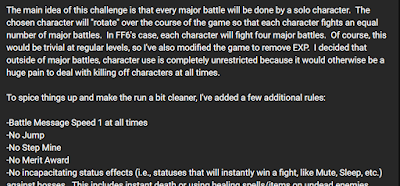Live A Live (1994, SNES)
Played the fan-translated Super Famicom version, natch.
Live A Live
is as good as it gets. Square at the top of their game making an
anthology of experimental micro-rpgs. Every one of them's a banger. If
it was just the seven chapters on their own, it'd still be essential
playing, but then the last two chapters tie everything together
pristinely. It's just a perfect little package, as good as any other
masterpiece Square put out at the time.
Every other rpgmaker dev I
know has been obsessed with this game for years; I can't believe how
long it took me to get around to it. There's stuff I've seen in my
friends' games or done in my own games I thought was really original and
clever. Then I discover Live A Live did the same things in 1994.
I'm
not discouraged — I think it rules that artists have always been doing
weird cool storytelling with the format. Instead of working in a
vacuum, we're part of an ongoing dialogue that's been going on for 3+
decades. To me, that's much more cool and exciting. If you're interested
in getting into the heads of people that made amazing games like LAL, I can't recommend this interview with director Takashi Tokita and other key staff members enough.
If
you spend a lot of time thinking hard about how rpgs work, if you're a
dev or an enthusiast player, you owe it to yourself to play Live A Live.

Romancing SaGa (1992, SNES)
The structure of this game is so nifty. It's almost like a magic trick,
where I don't want to spoil it. But the gist of it is that the game's
story progression isn't locked to any specific questline. The world
moves forward over time, with quests becoming available and also locking
out without you necessarily triggering any specific flags. Essentially
everything is optional — the path you carve through the game to get
strong enough to beat Saruin is entirely your own.
The downside of this approach is like, if the only thing you need
to do to win is get strong to beat one boss... it kind of makes the
whole game into one big thirty hour grind! You'd have to be playing it
in a really boring way for that to really be true, but most of the
quests are variations on "spend an hour fighting 100 random
battles in one of the mostly interchangeable dungeons." "The whole game
is grinding for one hard boss" is reductive, but not that reductive.
In a sense, it's the purest distillation of the appeal of post-GameBoy SaGa,
to the point of being hard to digest. To me, these games are about the
joy of fighting a whole mess of enemies and getting a constant drip-feed
of incremental stat and skill upgrades after nearly every battle. The
open world structure makes that more interesting, but I think that
aspect feels more special to SaGa fans than it actually is because of cultural myopia. There are tons of open-ended PC western RPGs from this era like the Ultimas, Might & Magic, Wasteland/Fallout, etc. "You can go anywhere!" is only unique to SaGa if you've mostly played Final Fantasy-style roller coaster games.
But nobody does the character progression dopamine drip-feed like SaGa.
It's not just the little stat ups after every fight — the systems and
setpiece bosses are complex enough that the progression always feels
substantive and rewarding. Grinding only feels good when there's a
challenge that makes the grind feel worth it, and SaGa final
bosses are terrifying monoliths. I barely scraped by Saruin at the end
of this game; I've played through a lot of RPGs, and nothing hits like a
SaGa climax.
I did finally get tired of the grind about
twenty hours in, switch from hardware to emulator, and speed through
the last ten hours with a fast-forward button. There's just ultimately
not a lot to it. It feels "pure" to me because it's so empty, and if
you're not already onboard with SaGa, I would recommend almost any of
the other games over this one.
But I adore these games. I think SaGa's
core appeal is more lizard-brained than we're often willing to admit,
but what's wrong with that? Number go up feel good. I've had a stressful
few months, and I had a lot of fun coming home and vegging out in front
of the SNES and button-mashing through another dungeon's worth of
battles. Romancing SaGa re-energized my love for the series, and I'm very excited to play one of the many new releases fans are feasting on. SaGa never dies! SaGa lives on!



